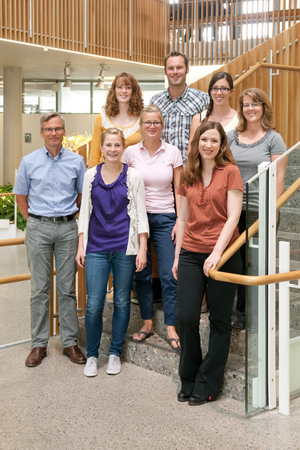SP 2
Genetic and functional heterogeneity within the tumor-initiating cell compartment of human colon cancer
Recently, a rare population of tumor initiating (“stem”) cells have been described in different tumor entities. These cells rebuild the tumor when transplanted into immunodeficient mice, whereas the bulk of tumor cells is not capable of initiating tumors or metastases. The inherent drug resistance of such tumor initiating cells (TIC) is considered the reason for tumor relapse after an initial clinical response. However, little hard data is available to characterize the role of tumor initiating cells in colon cancer biology or therapy resistance.
We were able to demonstrate that distinct classes of TIC which differ in their ability to self renew and initiate metastases form a malignant stem cell hierarchy within individual colorectal tumors. TIC are enriched and rapidly proliferate in spheroid cultures. After serial transplantation into immunodeficient mice long-term TIC (LT-TIC) rebuild tumors and metastasize. In contrast, tumor transient amplifying cells (T-TAC) only transiently contribute to tumor formation and do not metastasize. Rare delayed contributing TIC (DC-TIC) do not contribute to primary tumor growth, but are recruited to tumor formation after serial transplantation.
Based on these results we aim to understand the genetic alterations which enable TIC to continuously self renew and metastasize. Furthermore, the respective role of the supportive microenvironment will be examined. Moreover, we aim to understand whether the TIC compartment is composed of genetically identical cells or whether subclones with specific genetic mutations exist within individual tumors that are responsible for the functional heterogeneity described above. Understanding the distinct characteristics and functions of these most relevant cells within individual colon tumors will provide the basis for the development of innovative new treatment strategies.
Team SP2:
Dr. rer. nat. C. Ball, Dr. rer. nat. M. Schmidt, Prof. Dr. H. Glimm, S. Bergmann, T. Dubash, S. Dieter, S. Fessler, K. Giessler, E.-M. Hartinger, S. Hettinger, Ch. Hoffmann, L. Möhrmann, O. Zavidij, F. Oppel, S. Wenzel
Dr. rer. nat. C. Ball, Dr. rer. nat. M. Schmidt, Prof. Dr. med. H. Glimm
Team SP 2 |
Project-related key publications
Azoitei N, Hoffmann CM, Ellegast JM, Ball CR, Obermayer K, Gößele U, Koch B, Faber K, Genze F, Schrader M, Kestler HA, Döhner H, Chiosis G, Glimm H, Fröhling S, Scholl C. Targeting of KRAS mutant tumors by HSP90 inhibitors involves degradation of STK33. J Exp Med 2012 Apr 9;209(4):697-711. Epub 2012 Mar 26.
Schmidt M, Schwarzwaelder K, Bartholomae C, Zaoui K, Ball C, Pilz I, Braun S, Glimm H, von Kalle C. High-resolution insertion-site analysis by linear amplification-mediated PCR (LAM-PCR). Nat Methods 2007 Dec;4(12):1051-7.
Ball CR, Pilz IH, Schmidt M, Fessler S, Williams DA, von Kalle C, Glimm H. Stable differentiation and clonality of murine long-term hematopoiesis after extended reduced-intensity selection for MGMT P140K transgene expression. Blood 2007 September 15; 110(6): 1779–1787.
Deichmann A, Hacein-Bey-Abina S, Schmidt M, Garrigue A, Brugman MH, Hu J, Glimm H, Gyapay G, Prum B, Fraser CC, Fischer N, Schwarzwaelder K, Siegler ML, de Ridder D, Pike-Overzet K, Howe SJ, Thrasher AJ, Wagemaker G, Abel U, Staal FJ, Delabesse E, Villeval JL, Aronow B, Hue C, Prinz C, Wissler M, Klanke C, Weissenbach J, Alexander I, Fischer A, von Kalle C, Cavazzana-Calvo M. Vector integration is nonrandom and clustered and influences the fate of lymphopoiesis in SCID-X1 gene therapy. J Clin Invest 2007 August 1; 117(8): 2225–2232.
Schwarzwaelder K, Howe SJ, Schmidt M, Brugman MH, Deichmann A, Glimm H, Schmidt S, Prinz C, Wissler M, King DJ, Zhang F, Parsley KL, Gilmour KC, Sinclair J, Bayford J, Peraj R, Pike-Overzet K, Staal FJ, de Ridder D, Kinnon C, Abel U, Wagemaker G, Gaspar HB, Thrasher AJ, von Kalle C. Gammaretrovirus-mediated correction of SCID-X1 is associated with skewed vector integration site distribution in vivo. J Clin Invest 2007 Aug;117(8):2241-9.
Ott MG, Schmidt M, Schwarzwaelder K, Stein S, Siler U, Koehl U, Glimm H, Kühlcke K, Schilz A, Kunkel H, Naundorf S, Brinkmann A, Deichmann A, Fischer M, Ball C, Pilz I, Dunbar C, Du Y, Jenkins NA, Copeland NG, Lüthi U, Hassan M, Thrasher AJ, Hoelzer D, von Kalle C, Seger R, Grez M. Correction of X-linked chronic granulomatous disease by gene therapy, augmented by insertional activation of MDS1-EVI1, PRDM16 or SETBP1. Nat Med 2006 Apr;12(4):401-9. Epub 2006 Apr 2.
Fischer M, Schmidt M, Klingenberg S, Eaves CJ, von Kalle C, Glimm H. Short-term repopulating cells with myeloid potential in human mobilized peripheral blood do not have a side population (SP) phenotype. Blood 2006 Sep 15;108(6):2121-3. Epub 2006 May 30.
Glimm H, Schmidt M, Fischer M, Klingenberg S, Lange W, Waller CF, Eaves CJ, von Kalle C. Evidence of similar effects of short-term culture on the initial repopulating activity of mobilized peripheral blood transplants assessed in NOD/SCID-beta2microglobulin(null) mice and in autografted patients. Exp Hematol 2005;33:20-25.
Glimm H, Schmidt M, Fischer M, Schwarzwaelder K, Wissler M, Klingenberg S, Prinz C, Waller CF, Lange W, Eaves CJ, von Kalle C. Efficient marking of human cells with rapid but transient repopulating activity in autografted recipients. Blood 2005 Aug 1;106(3):893-8. Epub 2005 Apr 21.
Neff T, Horn PA, Peterson LJ, Thomasson BM, Thompson J, Williams DA, Schmidt M, Georges GE, von Kalle C, Kiem HP. Methylguanine methyltransferase-mediated in vivo selection and chemoprotection of allogeneic stem cells in a large-animal model. J Clin Invest 2003;112:1581-1588.
Schmidt M, Hoffmann G, Wissler M, Lemke N, Mussig A, Glimm H, Williams DA, Ragg S, Hesemann CU, von Kalle C. Detection and direct genomic sequencing of multiple rare unknown flanking DNA in highly complex samples. Hum Gene Ther 2001;12:743-749.
Glimm H, Eisterer W, Lee K, Cashman J, Holyoake TL, Nicolini F, Shultz LD, von Kalle C, Eaves CJ. Previously undetected human hematopoietic cell populations with short-term repopulating activity selectively engraft NOD/SCID-beta2 microglobulin-null mice. J Clin Invest 2001 Jan;107(2):199-206.
Glimm H, Oh IH, Eaves CJ. Human hematopoietic stem cells stimulated to proliferate in vitro lose engraftment potential during their S/G(2)/M transit and do not reenter G(0). Blood 2000;96:4185-4193.
Glimm H, Eaves CJ. Direct evidence for multiple self-renewal divisions of human in vivo repopulating hematopoietic cells in short-term culture. Blood 1999;94:2161-2168.
Dieter SM, Ball CR, Hoffmann CM, Nowrouzi A, Herbst F, Zavidij O, Abel U, Arens A, Weichert W, Brand K, Koch M, Weitz J, Schmidt M, v. Kalle C & Glimm H. Distinct types of tumor initiating cells form human colon cancer tumors and metastases. Cell Stem Cell 2011 Oct 4;9(4):357-65. doi: 10.1016/j.stem.2011.08.010.
To top





